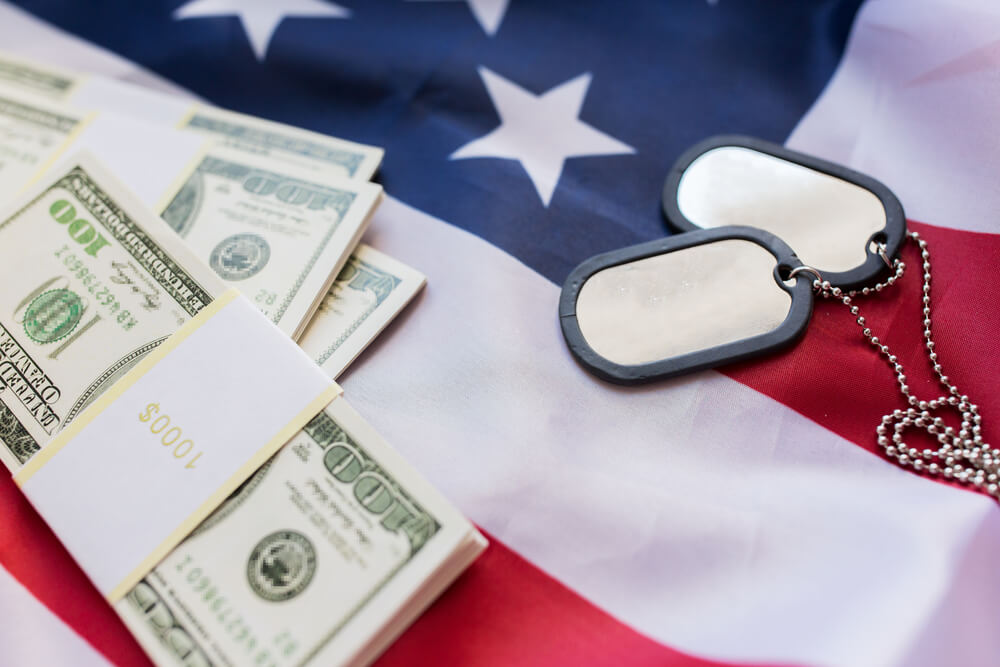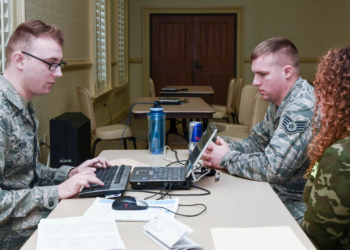What do you do when there’s more month than money? For many military families, payday loans and other predatory borrowing options become a source for quick cash.
An estimated 44 percent of active duty military used payday
loans in 2017, while 68 percent tapped tax refund anticipation loans, according
to research by Javelin Strategy & Research. While payday loans can seem
like a lifesaver in an emergency, these unsecured short-term loans typically
carry a 36 percent Military Annual Percentage Rate (MAPR) that includes
interest and other fees. These high-interest loans can trap military members
into a costly borrowing cycle that leads to larger financial problems.

Source: Javelin Strategy & Research
Now, changes in how the federal government’s top consumer watchdog supervises payday lenders could lead to a resurgence of “fast cash” financial products targeting military families. At issue is the decision by the Consumer Financial Protection Bureau’s (CFPB) Acting Director Mick Mulvaney to weaken enforcement of the Military Lending Act (MLA) by eliminating proactive examinations of creditors for violations. The CFPB has proposed investigations into potential MLA violations be conducted only in response to service member complaints.
During the Obama administration, the CFPB claimed authority under the Dodd-Frank Act to not only enforce the MLA but also to conduct routine examinations of creditors for MLA compliance. In addition, the Dodd-Frank Act’s passage extended MLA protections to a broader range of products to include credit cards, certain installment loans and overdraft lines of credit. Since its creation in 2011, the CFPB has returned a reported $130 million to service members, veterans and their families.
Scott Astrada, director of the Center for Responsible Lending, labels Mulvaney’s actions as “unequivocal obstruction” and called on the CFPB to resume stringent enforcement of the MLA within an industry that has been “aggressive to find regulatory loopholes in consumer protection gaps in protection.”
“The actions to roll back enforcement of the MLA are extremely concerning and are cause for alarm,” Astrada said. “The worst-case scenario is the same dangers and the same harms that service members and their families were subject to before the MLA will return and all those same negative impacts and dangers that they faced will return. It’s putting service members back in the crosshairs of predatory lenders.”
The MLA, which protects active-duty military members, National Guard and reservists (on active orders for 30 days or longer), spouses and their dependent family members, originally was signed into law in 2007. Its 36 percent APR cap includes finance charges as well as credit insurance premiums, application fees, add-on products and other fees often tied to predatory loans. Prior to passage of the MLA, predatory payday loan shops targeted service members with fast-cash schemes carrying interest rates of up to 400 percent.
This federal law also prohibits:
- Requiring military members to set up an allotment as a condition of receiving the loan.
- Requiring the use of a vehicle title as security for the loan.
- Requiring service members to waive their rights under the Service Members Civil Relief Act or any other federal law.
- Denying the opportunity for military members to pay off the loan early and any early-payment penalties.
This is not the first time CFPB’s oversight of payday lenders has come under threat. In 2017, the House of Representatives passed the Financial CHOICE Act, which had the support of 186 Republicans and no Democrats, but failed in the Senate. The bill would have made sweeping changes and repealed provisions of the Dodd-Frank Act, in part by weakening the power of the CFPB.
Retired Army Col. Paul E. Kantwill, a senior fellow at Loyola University Chicago School of Law, served as CFPB’s Assistant Director for Servicemember Affairs, from December 2016 to July 2018. He fears the CFPB’s rollback of military consumer protections–both on student loans and payday lending products–will be detrimental to service members, especially in light of the Department of Defense’s recent decision to “continuously” monitor the financial status of service members with security clearances.
“It all poses a threat to financial readiness, which poses an attendant threat to military readiness and, consequently, national security,” Kantwill said. “If folks get in [financial] trouble, they have the potential of having their security clearances suspended or perhaps revoked. That poses problems for individual units and the military as a whole. It also poses great problems for military families. Finances are a big predictor of military success. There are a bevy of potential consequences here and all of them are bad.”
Military and veterans service organizations and consumer organizations are speaking out against any weakening of MLA protections. This fall, Veterans Education Success published a letter headlined “Don’t Abandon Military Families” in newspapers near military bases. The letter, signed by more than two dozen military groups, called on the CFPD and DOD to preserve service members’ rights under the MLA. An online petition is bolstering their effort.
The Military Officers Association of America (MOAA) is among those groups arguing for preservation of strong oversight of payday lenders. Aniela Szymanski, MOAA director of government relations, is hopeful CFPB Director nominee Kathy Kraninger will “reconsider the bureau’s position on the MLA when she takes the helm.”
“Right now, servicemembers are essentially being provided assistance by the bureau than the general public,” Szymanski states. “The bureau is still doing supervisory exams. They are still going in and looking at financial institutions’ compliance related to the Truth in Lending Act, the Fair Credit Reporting Acts, but they are purposefully excluding the MLA, if they are doing what we suspect they are doing. That means every other consumer in America is getting oversight assistance from the bureau except the military community.”
The CFPB did not respond to multiple requests via email and telephone for comment.
Resources for military families:
Military life brings challenges such as deployments, frequent moves and underemployment of spouses that can make keeping your financial house in order a tall order. Even so, there are places to turn other than payday lenders when money is tight.
The military relief societies–Navy Marine Corps Relief Society, Air Force Aid Society, Army Emergency Relief, Coast Guard Mutual Assistance–all offer expedited, interest-free emergency loans to eligible service members in amounts from $500 to $1,000, depending on the military branch. Requests for larger denomination interest-free loans and grants require an appointment.
Operation Homefront provides financial assistance for overdue bills, auto repairs, childcare expenses, travel or other needs to eligible enlisted service members, E-1, E-6, with DEERS-eligible dependents. Assistance is prioritized by critical need.
Veterans of Foreign Wars’ Unmet Needs program provides grants of up to $1,500 to service members and their families who have run into unexpected financial difficulty due to a deployment or other military-related activity or injury.
Negotiate a payment plan with your creditors and adjust your payment due dates to better align with military pay dates.
Consider joining a credit union, many of which offer lower-interest personal loans.
Service Members Civil Relief Act (SCRA) requires lenders to cap interest rates on loans and credit card balances on pre-existing debt accumulated prior to entering military service. However, several credit card companies (Capital One, USAA, American Express, U.S. Bank, Bank of America and Discover) extend those benefits and may offer lower interest rates or waive or refund annual fees and late fees on charges accumulated while on active duty.
Read comments






































